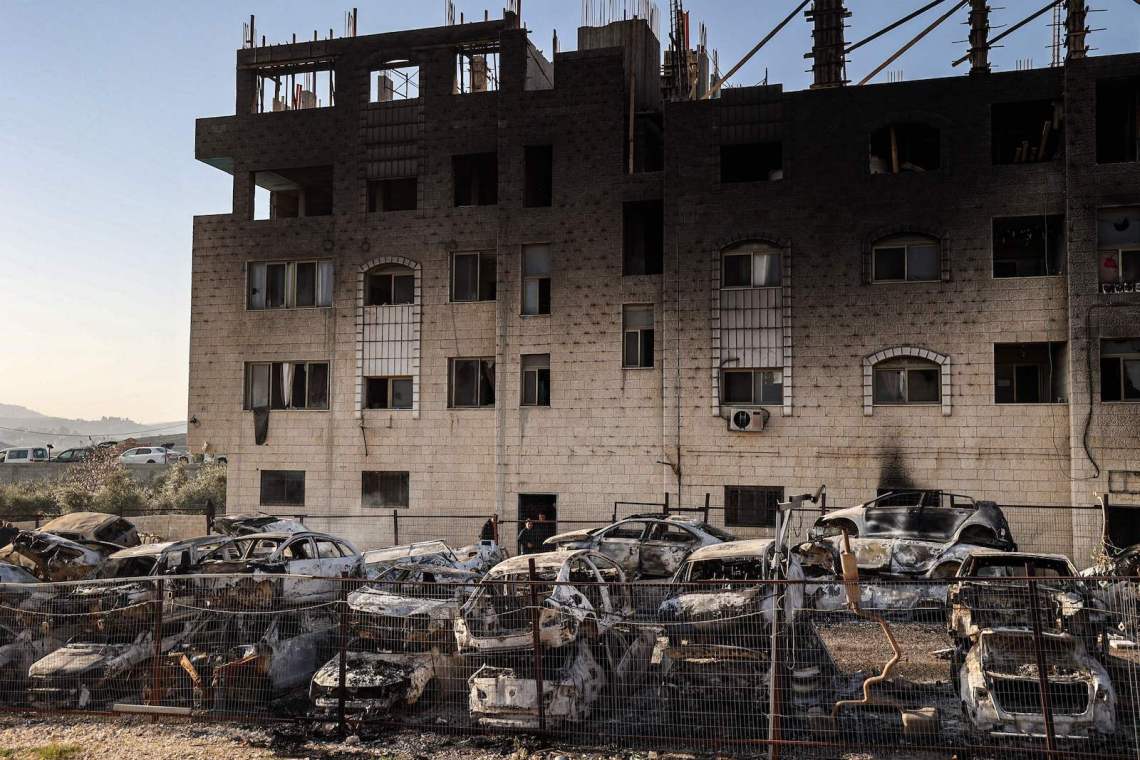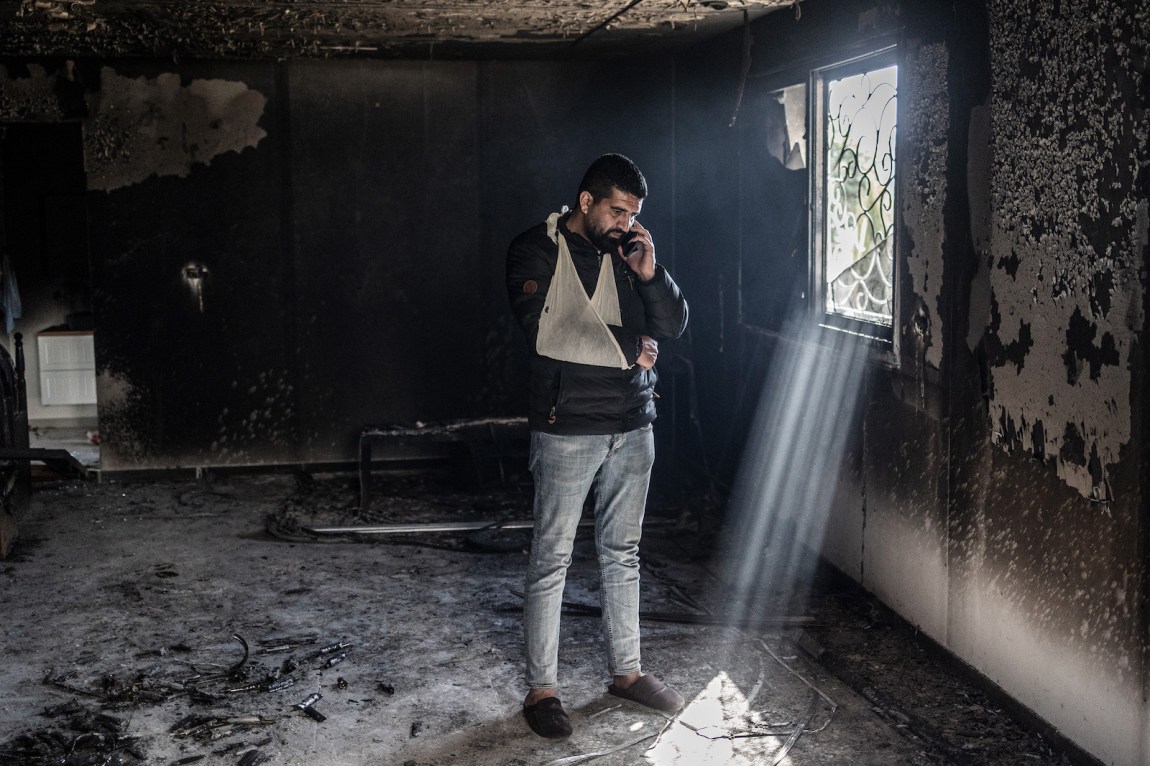Armed Jewish vigilantes going house to house, knocking down doors, blasting through windows, shooting, and setting entrances and exits on fire; terrorized residents gathering children and the elderly and hiding them in bedrooms, or rushing them out to the street despite the unknown dangers there, or climbing onto rooftops to hide behind water tanks; men rushing back from work after hearing that their village is under attack; the smell of gasoline, charred cars, and burning furniture; gunshots and angry orders yelled in Hebrew to bewildered Palestinians frozen in place, or running blindly; confusion, terror, and the knowledge that there is no protection, no army ready to beat back the assault, only sheer determination to survive: these images are seared into the minds of most Palestinians. Between 1947 and 1949 armed Zionist militias roamed through Palestine, ethnically cleansing the inhabitants of more than five hundred villages, massacring many, and forcing out an estimated 750,000 Palestinians, who along with their descendants remain scattered across the world. Stories of the Nakba, the catastrophe of 1948, are central to Palestinian consciousness, passed down from generation to generation in history books and at the family table.
So the news on February 26 from Huwara, a village south of Nablus in the occupied West Bank, struck fear into most Palestinians, who know where this story ends. The day before, two Jewish settlers—brothers living in the illegal settlement of Har Bracha, one fresh out of army service, the other about to start—were killed by a Palestinian gunman as they drove through the village. (Palestinians often target settlers and military personnel, whose presence in the West Bank is illegal under international law, and those settlers regularly pass through Huwara on their way to and from settlements in the northern West Bank.) Presumably to seek vengeance, hundreds of settlers armed with knives and guns took to Huwara’s streets and those of nearby villages on a bender of destruction and crime, leaving behind a dead man, hundreds injured, the charred remains of vehicles and buildings, and traumatized families who had been blocked from escaping their blazing homes. Al-Haq, the preeminent Palestinian human rights organization, called the rampage a “systematic act of reprisal and collective punishment” that may amount to a crime against humanity.
In the aftermath of the attack, politicians described it as an eruption of lawlessness. Opposition leader Yair Lapid said that the government has “lost control” over Israel’s security and led the country into “anarchy.” Prime Minister Netanyahu asked Israelis “not to take the law into their own hands” and to “let the IDF and the security forces do their job.” But the settlers were not acting on their own: the army covered their every move. At the entrances to the village, witnesses reported that soldiers let settlers enter on foot but held back journalists, medics, and Palestinian aid workers. Military personnel are said to have stood by, watched the settlers set fires, and blocked residents from reaching their loved ones or interfering with the settlers as they marched through the village. The state’s legal system, too, is built to whitewash Israeli crimes. More than four hundred attackers reportedly ripped through Huwara. That night six were arrested, five of whom were released within two days. By Wednesday only eight more arrests had been made.
*
Armed settlers are Zionism’s contemporary pioneers. Most of them are religious ethnonationalists, full of messianic zeal and determined to facilitate Israel’s expansion. That mission has a system that predates the Nakba and the establishment of the state of Israel: to frighten Palestinians off their land and create outposts for taking over the territory. The state does not officially plan these settlements, but it legitimizes most of them after the fact. For those Israelis and their allies who have normalized the events of 1948, accepted them as a necessary fait accompli in their state’s formation, the stories from Huwara are an important reminder that settler violence remains central to Israeli nation-building.
Such violence has been rising over the past decade, reaching a peak last year, according to UN figures. Human rights organizations have been documenting almost daily settler attacks throughout the West Bank, many of which take place under the army’s watch. Armed settlers descend on Palestinian fields, steal livestock, uproot olive trees, and chase farmers away, cutting them off from their livelihood. In recent years, armed settler militias have patrolled roads, targeted Palestinian cars, and even invaded smaller towns and villages next to their settlements. B’Tselem, Israel’s leading human rights group, notes that “continuous, systemic violence meted out by settlers is part of Israel’s official policy, driving massive takeover of Palestinian farmland and pastureland.”
The majority of these attacks take place in Area C, which constitutes more than 60 percent of the West Bank. (Area C comprises mostly rural areas and villages, and is fully under Israel’s security purview; Area A, around 18 percent of the West Bank, is made up of urban centers ostensibly under Palestinian security control. Huwara is in Area B, which comes under Israel’s security control and Palestinian civil administration.) Area C is the only contiguous territory in the West Bank, and Palestinians moving between cities like Ramallah and Nablus have to traverse it. Over the past year many have been noticeably warier of making those journeys because of settler violence and have stayed confined in their urban enclaves.
Advertisement
And yet for the past two decades most of the death and destruction in the occupied territories has still been carried out directly by the army. Last week troops wreaked havoc when they invaded Nablus, killing eleven Palestinians and injuring more than a hundred. Israeli military assaults on Gaza flatten entire neighborhoods and kill hundreds of Palestinians. Settler violence has been simmering in the background, creating an atmosphere of terror and intimidation but at nowhere near the same scale of death and destruction. In Huwara the violence boiled over. The scale of the attack, its duration (it lasted five hours), and the explicit support it received from senior officials all suggest that the government is increasingly outsourcing its violence to its colonial pioneers. This is not a breakdown of the state’s monopoly on violence; it is the delegation of that violence to enforcers on the frontier.
The current Israeli government is the most right-wing in history, and Zionist pioneers have a new degree of backing from the highest offices in the state. On the day of the rampage, Davidi Ben Zion, the deputy head of the Samaria Regional Council, called for a war crime. “Hawara should be wiped out today” with “no room for mercy,” he wrote. Israel’s new minister of public diplomacy called Palestinians “brainwashed murderers who are programmed to seek Jewish blood since age zero.” A day later the national security minister, Itamar Ben-Gvir of the far-right Otzma Yehudit party, called for the “elimination” of the Palestinian factions’ leaders. He said that the army, rather than the settlers, should handle such extrajudicial assassinations, but he himself has demonstrated that supremacist violence is hardly the purview of the army alone. While settlers were working to evict families from Sheikh Jarrah in East Jerusalem in 2021, he walked down the street brandishing a gun a day after threatening to “mow down” Palestinians in the neighborhood.
Days before the attack on Huwara, the Israeli government, already engaged in a de facto annexation of the West Bank, folded most of the authority over the region into the remit of the far-right finance minister Bezalel Smotrich, who also has a position in the Ministry of Defense, making him, in the words of a recent report from the Foundation for Middle East Peace, “the new reigning sovereign.” (After the rampage Smotrich said that that Huwara should be “erased.”) Such a change to the structure of governance in the West Bank—long opposed by the US and the EU, whose leaders still believe in the delusion that Israel’s occupation is temporary—formalizes the permanence of Israel’s hold and ends the supposed separation of powers between the state and its occupation. This is an apartheid state brazenly pursuing a settler-colonial agenda on every level, from its marauding settlers to its supreme court.
On the day Huwara burned, Israeli leaders, Palestinian Authority officials—whom Palestinians have long viewed as the subcontractors of the occupation—and American diplomats all convened in Aqaba under Jordanian mediation to discuss deescalating the violence of the past few weeks. Hours after the US State Department issued a statement noting that Israel had committed to pausing settlement construction for four months, Prime Minister Netanyahu tweeted: “There is and will not be any freeze.” There is no doubt that the ongoing chorus of calls for territorial expansion and demographic warfare heralds more murder and expulsion. Palestinians have long warned of a second Nakba, and Huwara is a sign of what will come.




